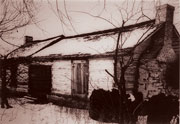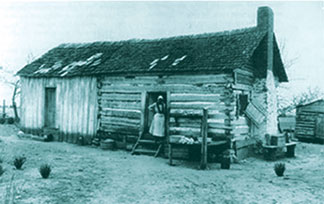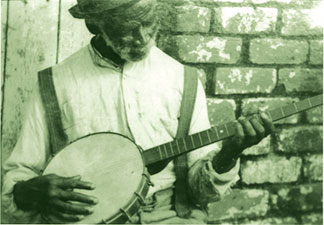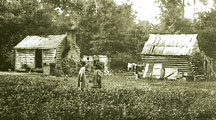

I WAS A SLAVE: Plantation Life
Slave Cabin in the Snow © Enhanced Photo: IWASASLAVE.com
Compiled by Donna Wyant Howell
Part Three of a Four Part Series
In the 1930s, thousands of formerly enslaved African-American elders dictated their full life stories during interviews conducted by the US Government. The following is the translation of their words from southern dialect into standardized English. Their original words are published in “I WAS A SLAVE,” a series of books.
It is very important to remember that each owner created his or her own rules for governing their slaves. Therefore, the interviews provide accounts of vastly different experiences during similar circumstances.
NIGHTTIME WORK
Most of us know that slaves worked from “can see” to “can’t see,” but what about the hours after dark? The duties and their durations depended on the requirements of each slave owner, so they varied.
Nelson Davis (Tex.): Every morning, the slaves were awakened about four o’clock and sent to the fields to plough, hoe, cut brush or firewood and do other work. They always worked until about dusk.
Thomas Cole (Ala.): We’d get up early every day of the year — rain or shine, hot or cold. A slave blew the horn and there was no danger of us not waking up when it was blown long and loud. … We’d work until noon and eat in the shade. Then, we’d rest for about an hour or a little more if it was hot, but only for an hour if it was cold. We were always tired when we worked throughout a day like that on the plantation.
Thomas Johns (Tex): After de cotton was ginned, it had to be baled. They would make their slaves work even though it was too dark to see how to pick cotton. Working without supper, they bailed cotton even if it took until four o’clock in the morning.
Annie Osborne (Ga.): I always worked in the master’s house. I took care of the white children, spun cloth, and did housework. My mammy … worked in the field during the day and helped with the stock at night. After supper, they made her spin cloth.
Henry James Trentham (N.C.): Most of the time, some of the women plowed while bare-footed. They had to till the row, keep up with the men, and then do their cooking at night.
Martha Bradley: I always worked in the field and had to carry big logs. I had straps on my arms. Logs were put into the straps and I would haul them to a pile where the rest were.
Anna Miller (Tex): I helped to card, spin, and cut the thread. We made all of the cloth for the clothes, but we didn’t get to wear them. In the winter, we almost froze to death. The weaving was the night work after we worked all of the day in the field.
James V. Deane (Md.): Some slaves had small garden patches, which they worked by moonlight.
Willis Easter (Tex): On our place, all of the trash in the cotton was picked out by hand. It was a slow job in getting the seeds and twigs out of the cotton. During many nights, I’ve gone to sleep while sitting by the fire and picking. In bad weather, we sat by the fire, cleaned cotton, patched harnesses and shoes, or whittled something, such as dishes, bowls, troughs, traps, and spoons.
Gill Ruffin (Tex): On rainy days, we shucked corn in the crib.
Isaam Morgan (Ala.): What did we do after we finished work? Go to bed! That was the only thing that we could do. We were so tired that we couldn’t lie down for as long as two minutes before we were asleep.





Be the first to comment